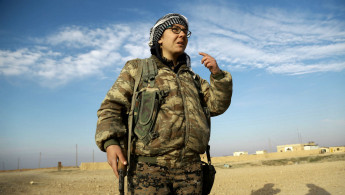British volunteers with Syrian-Kurdish forces to ignore UK government ban
A group of British citizens who travelled to Syria to fight or work alongside Kurdish forces in the country's north have said they will defy new legislation that would see them prosecuted on terrorist charges.
UK nationals were told in May they had just 28 days to leave northern Syria or risk up to ten years in prison on terrorism charges on their return to the UK.
The new restrictions apply to all, regardless of whether the Britons are involved in fighting or are simply aid workers.
But UK citizens who traveled to northern Syria to partner with the Kurdish forces who control sections of northern Syria say they won't be scared into leaving.
Tens of Britons have been drawn to the autonomous region, known as Rojava in Kurdish. While some have fought with the Kurdish People's Protection Units (YPG and YPJ) against the Islamic State group, others traveled to Syria to volunteer in civil society projects. Most were motivated to join forces with the Kurds after hearing of the region's leftist, anti-capitalist and feminist project.
British volunteers in Rojava told The Telegraph that the UK government had wrongly associated them with other citizens who had traveled to Syria to join IS.
Indeed, both the UK and US have partnered with the YPG/J in the fight against IS.
The volunteers say they are more akin to the International Brigades, the foreign volunteers who went to fight with Spanish anti-Fascists against Franco in the Spanish civil war in the 1930s.
"On the one hand, [the Home Office] talks about the UK's need for international co-operation with the Kurds in fighting terrorism. And on the other, it is punishing those of us who come here to do just that," Matt Broomfield, a 25-year-old media professional from Shropshire who left the UK one year ago, told The Telegraph.
Broomfield has helped local media projects to spread news from the region while in Syria. He has also written articles for the UK press.
"It's a ham-fisted attempt to prosecute jihadists under a catch-all law after previous laws proved inadequate," he said.
Just one in ten returning IS fighters have been prosecuted in the UK as British courts struggle to find admissible evidence against those who fought in Syria. The new legislation would enable the UK to prosecute IS fighters just by evidencing they had remained in Syria after the law was introduced.
While the new 28-day grace period has not yet begun, volunteers for the Kurdish forces said they would remain in Syria regardless.
"When I heard about the new law I thought about it for 30 seconds before deciding I couldn't just abandon all we’ve done here," Theo Stevens, a 29-year-old who has been volunteering with a civil society organisation for five months, said.
"[IS] may have been defeated territorially, but there's a lot more work that needs doing than fighting."
Broomfield added: "I won't be leaving, regardless of the government's draconian actions, as I consider their threats toward those in northeast Syria illegitimate and worthy of resistance."
Eight UK citizens have so far died in Syria while fighting with the Kurdish forces.
Jac Holmes stepped on a mine in Raqqa, the former IS stronghold, a day after helping to liberate the city from the extremist group.
Anna Campbell was killed in Afrin as the YPG battled against Turkish-backed forces.
Another volunteer, Lizzie Irvine, said she thought the Home Office decision would deter other UK citizens from volunteering in Rojava.
"Something beautiful is growing in an ugly part of the world and I feel a duty to help that flourish," said the 30-year-old, who has been working in an all-female housing commune for widows and Yazidis rescued from IS.
"Britain shouldn't be criminalising people like us."
Broomfield added that the volunteers were planning to raise their case in parliament via an Early Day Motion.
Labour MP Lloyd Russell Moyle, who visited Rojava last year, told The Telegraph: "This is a lazy law that will cause more harm than good. Locking up returning NGO workers and volunteers is absurd, antithetical to our values and a blow to development in the Middle East."





 Follow the Middle East's top stories in English at The New Arab on Google News
Follow the Middle East's top stories in English at The New Arab on Google News
![The UAE is widely suspected of arming the RSF militia [Getty]](/sites/default/files/styles/image_330x185/public/2024-11/GettyImages-472529908.jpg?h=69f2b9d0&itok=Yauw3YTG)
![Netanyahu furiously denounced the ICC [Getty]](/sites/default/files/styles/image_330x185/public/2024-11/GettyImages-2169352575.jpg?h=199d8c1f&itok=-vRiruf5)
![Both Hamas and the Palestinian Authority welcomed the ICC arrest warrants [Getty]](/sites/default/files/styles/image_330x185/public/2024-11/GettyImages-2178351173.jpg?h=199d8c1f&itok=TV858iVg)